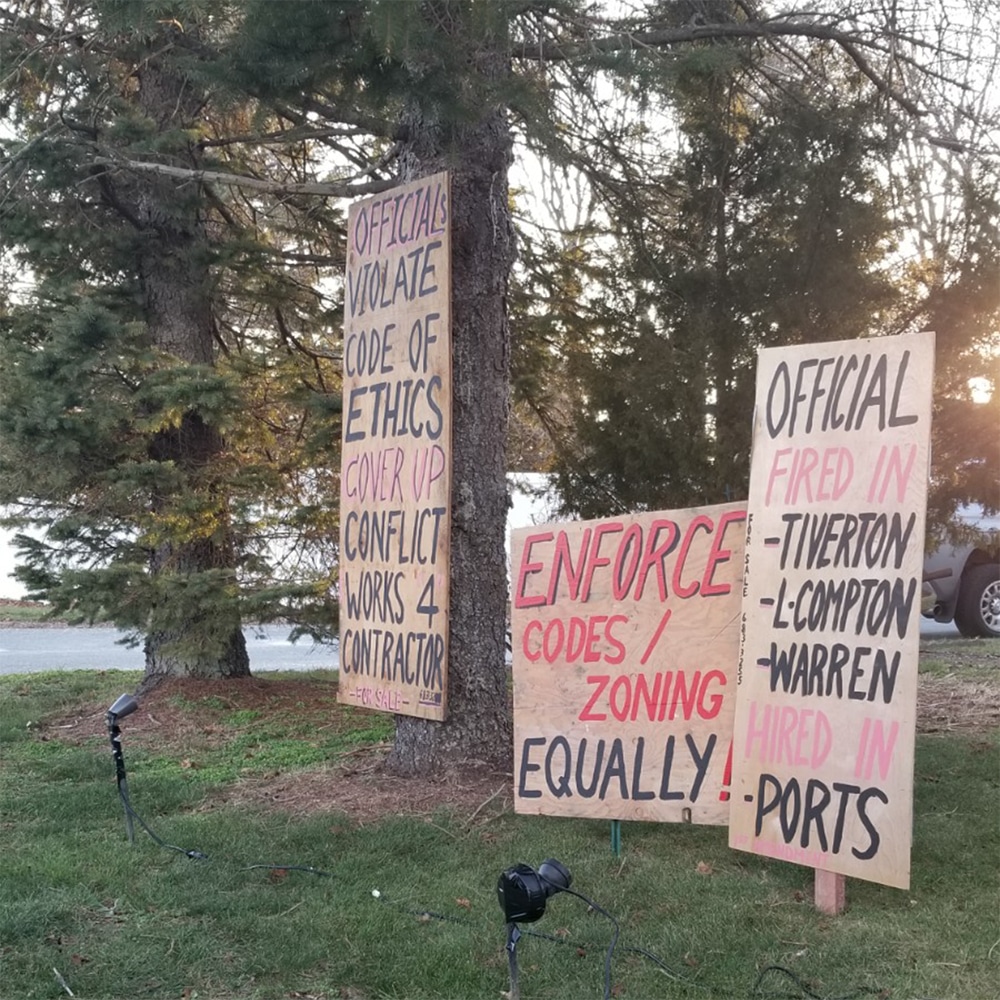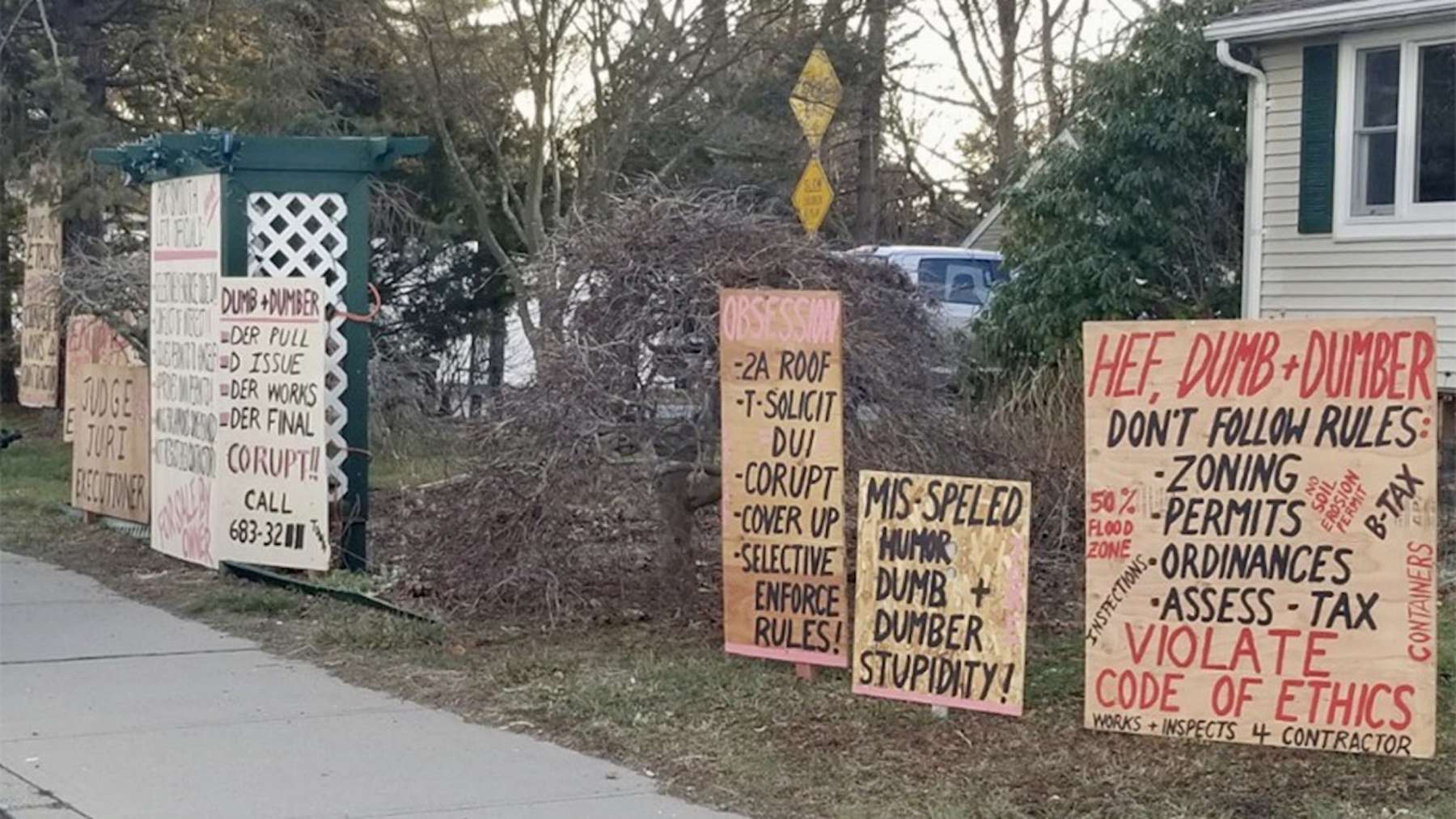ACLU of RI: Portsmouth political sign ban violates First Amendment
“I have been the victim of selective enforcement and harassment by many Town of Portsmouth officials,” said town resident Michael DiPaola. “All I’ve wanted from Day One is to be treated the same as everyone else, nothing more. The rules apply to everyone equally, or none at all. I was left no other option!”
January 22, 2021, 1:51 pm
By ACLU of Rhode Island
UPDATE ON PORTSMOUTH POLITICAL SIGN BAN LAWSUIT, January 26, 2021
Pending a ruling on the merits of the lawsuit filed against the Town on Friday, Portsmouth officials have agreed not to issue a summons to Michael DiPaola to enforce its sign ordinance for his display of signs on his property on Bristol Ferry Road. The agreement was made at a chambers conference held late yesterday before United States District Judge William Smith on ACLU of RI cooperating attorney Richard A. Sinapi’s request for a temporary restraining order against enforcement of the ordinance.
The ACLU suit was filed after the Town threatened a $500-a-day fine per sign against Mr. DiPaola for erecting nine signs on his property that, according to the lawsuit, express “his opinions criticizing perceived selective and corrupt code enforcement by the Town.” The suit argues that the Town’s restrictions on the posting of political signs violates DiPaola’s free speech rights.
The judge set an expedited schedule for both sides to file briefs in the case before he issues a formal ruling. More information about the lawsuit can be found here.
A federal lawsuit filed by ACLU of RI cooperating attorney Richard A. Sinapi challenges a Portsmouth town ordinance that bans the posting of political signs on residential property. The lawsuit is on behalf of town resident Michael DiPaola, who recently erected a series of signs on his property that express “his opinions criticizing perceived selective and corrupt code enforcement by the Town.”
DiPaola has had a running feud with Town building officials, and the suit claims he “posted the first sign after five years of frustration and perceived harassment” from them, “both in excessively enforcing codes against him and refusing to enforce building codes against others.” Over the course of a few days last week, he posted additional signs, and on January 14th, he was issued a notice of violation of the town’s zoning ordinance. The notice alleged that DiPaola failed to obtain a permit required to display the signs, that political signs were not a category of sign allowed to be displayed in residential areas, and that the display also violated a provision banning signs that “interfere with, mislead or confuse traffic.” He was given seven days to remove the signs or else face $500 a day fine for each sign left standing.

The lawsuit argues that the zoning ordinance violates DiPaola’s free speech rights under the First Amendment by, among other things, “permitting only signs with specified content to be erected; exempting certain permitted signs from the requirement of obtaining a permit; and prohibiting all other speech, including political speech.” Thus, the suit claims, the ordinance has the unconstitutional effect of regulating political speech more harshly than other types of speech. The suit also challenges the ordinance’s failure to “provide any guidelines or criteria which must be followed and applied by a Building Inspector in making a determination as to whether or not to grant a sign permit.”
The complaint notes that the U.S. Supreme Court has found that “residential signs are a form of unique expression entitled to the highest degree of protection” under the First Amendment.” The lawsuit seeks a temporary restraining order against enforcement of the ordinance, and an award of compensatory damages and attorneys’ fees.
Plaintiff DiPaola said: “I have been the victim of selective enforcement and harassment by many Town of Portsmouth officials. All I’ve wanted from Day One is to be treated the same as everyone else, nothing more. The rules apply to everyone equally, or none at all. I was left no other option!”
ACLU of RI attorney Sinapi added: “Prohibiting the posting of political signs on residential property or requiring a permit before doing so is the exact opposite of free speech and is directly contrary to the free and open exchange of ideas and information essential for a democracy to exist. Political speech is at the core of the First Amendment, and the ordinance’s more favorable treatment of non-political speech simply cannot withstand constitutional scrutiny. The danger to First Amendment values is especially great when a public official is given unbridled discretion to decide who may speak and who may not, particularly where political speech – expression essential to the functioning of a democracy – is involved.”






